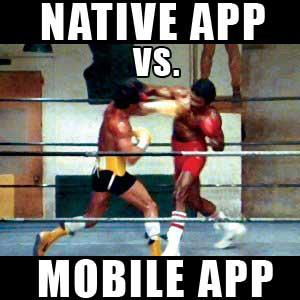 Website Design and Development Trends
Website Design and Development Trends
The days of sitting at one's desktop computer to surf the web are long gone. With the advent of smartphones and tablets, people are accessing information in the palms of their hands at an alarming rate. So what does this mean for smart businesses? It means they need to be prepared to share their information on the mobile web. This brings up another question: is it better to have a native app or a mobile-optimized website for your business?
Native Apps are faster, more interactive and can access your mobile device features. They’re good for regular usage/personalization, with no connection required. Native apps are built using programming language specific to the platform of a particular mobile device, so one native app can’t run on different mobile platforms and every platform needs to have its own native app. Most of the games you play on your smartphone are native apps.
Mobile sites are easier to navigate, instantly available, easy and inexpensive to build and update, compatible across all devices, can be found more easily, and have broader reach. If a mobile site is developed for one’s business, a
responsive design is the best way to go. A responsive design adjusts to the device it is being viewed on, whether it’s a PC, tablet or smartphone.
Mobile Web Apps can function across all platforms from any mobile device. They can only partially use features of a mobile phone, i.e., the GPS but not the camera. They are not available in an app store, so they don’t require any approval process. Web apps can be used without having to be downloaded and installed onto a mobile device. An example of a web app is Google Calendar.
Mobile Websites
1. Accessed by smartphone and tablets through the web browser
2. Static, navigational user interface
3. Requires connection
4. Somewhat limited features
5. Speed - Fast
6. Development cost - Reasonable
7. App store - Not necessary
8. Approval process - none
Native App
1. Accessed after being installed from app store onto mobile device
2. Specifically designed to work only on the operating system of the device downloading the app
3. Interactive user interface
4. Available offline
5. Can access phone features like GPS, camera, etc.
6. Speed - Very fast
7. Development cost - Expensive
8. App store - Available
9. Approval process - sometimes mandatory
10. Require periodic updates in order to continue working properly
Native apps offer a superior experience in the context of today’s technology. They leverage components of their native operating system so they look and feel more polished, run faster, and are thoroughly integrated with the mobile device. Native apps are only as good as the present technology so as technology continues to evolve, native apps are likely to become obsolete.
Mobile Web App
1. App store or marketplace not needed to download and install web app
2. Specifically designed to work only on the device’s OS
3. Interactive user interface
4. Accessed through the mobile device’s web browser
5. Cannot make use of all phone features like camera, stored photos, etc.
6. Speed - fast
7. Development cost - Reasonable
8. Not available for purchase from app store; as such, it can be harder for users to find your app
9. Approval process - none
10. No need for updates: the most current version is loaded each time a web app is opened.
A web app is typically coded in HTML combined with JavaScript. While fundamental differences will likely remain between a native and web app for some time, the user experiences provided by both interfaces are increasingly indistinct, as most native apps utilize real-time web connectivity and web apps provide offline modes that can be accessed without network connectivity. As a result, some of these apps are now referred to as hybrid apps.
It comes down to the goal of your site or business and budget. If your objective is to offer mobile-friendly content, reach a broader audience, offer immediate access to your business, the ability to make frequent updates, and you have a limited budget, then a mobile site is probably best for you. If you want to offer an interactive experience to your user, add personalization to your service/business, allow users to access their mobile device functions (GPS, camera, contacts, etc), and give the user access to your site without being online, then a native app might be your solution. Ultimately, mobile users want ease of access, a fast connection, and a smooth look and feel. Looking ahead to trends in the coming year, smart businesses are likely to embrace the strengths and differences of all development options, even including the use of web-native hybrid apps in addition to mobile websites. This varied approach challenges us to stay on top of tumultuous trends, new technology and anticipate consumer demand.
 Website Design and Development Trends
Website Design and Development Trends